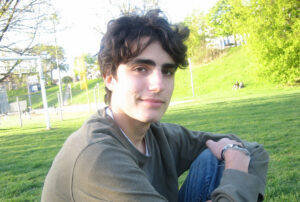 Oliver Principe-Beer sat on a crowded bus in his hometown of Toronto, Ont. when he received a call from an unknown Nova Scotian number. Principe-Beer was hesitant to answer but he did anyway. To his delight on the other end of the line was Foundation Year Program director Dr. Neil Robertson telling him he won the King’s essay writing contest.
Oliver Principe-Beer sat on a crowded bus in his hometown of Toronto, Ont. when he received a call from an unknown Nova Scotian number. Principe-Beer was hesitant to answer but he did anyway. To his delight on the other end of the line was Foundation Year Program director Dr. Neil Robertson telling him he won the King’s essay writing contest.
“I actually got off the bus early, and the first thing I did was call all my friends,” said Principe-Beer. Sharing the good news almost immediately.
The King’s essay contest is an annual competition for Grade 12 students that invites them to write a short essay in response to a question. The winner wins a gift card to the King’s Co-op Bookstore that is the same value as their Foundation Year Program booklist cost. Entrants use one text of their choice to support their arguments. This year’s question asked, ‘How does villainy contribute to a work of literature?”
Principe-Beer selected a book that he read as a child, which he describes as “the first serious book that I ever read.” On family vacations, he and his father would each bring two books with them, Principe-Beer choosing books which were geared towards children. On vacation in the fourth grade, he finished the books he brought and decided to pick up Philip Roth’s The Plot Against America, a novel the presents an alternative history of the United States if Charles Lindbergh had run for president and won the 1940 election over Franklin D. Roosevelt. Lindbergh was an influential American figure who became famous after flying for 30 hours from New York to Paris in 1927. He became politically involved in the late 1930s, advocating that America staying neutral in the Second World War. In his essay “The Plot Against America and Faceless Evil,” Principe-Beer argues that Charles Lindbergh, who is never directly portrayed in the book, influences each of the characters actions.
When Principe-Beer first read the novel, he felt connected to it because he was the same age as the main character, Philip Roth. Roth is a member of a Jewish family becoming increasingly isolated as the novel progresses as antisemitism becomes increasingly socially acceptable.
Despite Lindbergh never openly stating antisemitic policies in the book, Principe-Beer writes in his essay, “villainy doesn’t need to be explicit to exist.” Despite having no direct interactions with any of the characters, Lindbergh is nonetheless “ever present and never seen,” heard on the radio and his opinions spread through propaganda, eventually invading the dreams of the main character, where he sees images of Adolf Hitler and Nazi symbols on his stamp collection. For Principe-Beer, The Plot Against America is the “story of a child transposed in a changing world,” one where anxiety fuels a turn towards fascism, characters appearing to embrace Lindbergh and his social views because he “promises peace, stability, and prosperity” at the expense of the safety and security of the Roth family and the larger Jewish community.
Describing the novel as being like a Twilight Zone episode, Principe-Beer was interested in writing about the influence a villain exerts upon the narrative and other characters, rather than describing a direct portrayal of a villain. He said, “Lindbergh is never cartoonish, or a caricature. He is never overwrought; he is just this expert political maneuverer who is using his clout and institutional power to ruin and destroy the lives of the main character and people like him. That’s what really compelled me to write this essay, how removed the villains are from the villainy.” In choosing The Plot Against America, Principe-Beer writes about the experience of growing up in a time of political uncertainty as a member of a minority group targeted by the state.
Principe-Beer will learn more about political influence and morality when studies in the Foundation Year Program next year. Excited to attend King’s in the fall, when asked about what winning the contest meant to him, Principe-Beer said, “getting many high-quality books is pretty nice,” as well as knowing that his essay placed first.

